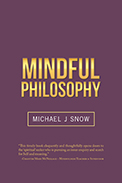
 |
An incredible work into mindfulness, philosophy, and mindful philosophy, the book examines the principle of non-duality, an acceptance of the dialectical (both/and) instead of the duality of either/or. It examines the four precepts for non-dual philosophy which then leads the reader through a number of religions/philosophies/psychologies, as well as science, to relate the unity within these beliefs and traditions. By exploring Christianity, the works of Plato and Socrates, Gnosticism, Sufism, Buddhism, Taoism, Advaita Vedanta, indigenous traditions, the Transcendentalists, and the Perennial Philosophy (as well as others) the reader is given significant information that reveals the underlying principle of the Divine and divinity. The examination of our psychologies with people such as Carl Jung and Ken Wilber along with scientific evidence reveals the necessity of focusing on mindful practice in order to help us to grow as humans into the wealth of the spirituality that engulfs us.
While the author notes this is an “introductory book,” it is far from basic with its depth of study and the beauty in which the concepts are written. This is a very significant work that potentially will be embraced by people of varying beliefs and traditions who choose to accept that we are all one. This is the message of non-duality. With the first part of the book focusing on education and the latter part focusing on practices including attention, presence, non-judgment, and letting go of desire, one can learn meditation, mindfulness, breathing techniques, focusing on the senses, and insight meditation. All of these techniques, along with the insight regarding the mindful philosophy of non-duality, are designed to lead one to a higher state of connection. This is a book to be savored.
RECOMMENDED by the US Review